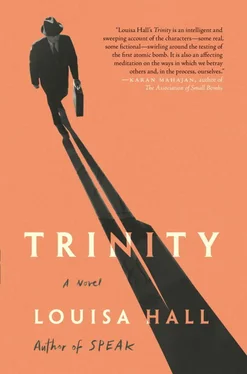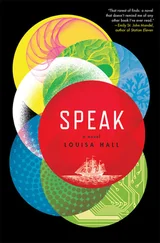Then he said that he cared for me too much to continue to hurt me. He said it had become absolutely clear to him that no matter how he tried to explain his actions, or apologize for having behaved in the manner he did, his presence in the house could only continue to hurt me.
He had become, he said, nothing more than a visitation of a past pain. He had become a walking reminder of a fatal mistake that couldn’t ever be fixed. And anything he did now, any attempts he might make to redefine himself once again, were bound to be failures.
Listen, he said. What I did is in me now. It’s a disease that can’t be cured, and if I stay here, I’ll only infect you.
I’ll only infect him, he said, gesturing at our son’s room.
The only hope, he said, is to remove myself. You’ll be better off in my absence.
I REMAINED THERE BESIDE HIM, STARING AT THAT AWFUL HAND, ANDwhat I wanted to tell him was that he’d already infected me, and that he’d already infected our son.
He’d already irrevocably changed us. The violence of cutting himself out of our lives would only change us more awfully.
But while I was still formulating the words I wanted to use, my husband was already saying that he’d found a house south of town, a small place out in the country.
He planned, he said, to move out that night.
He was still looking down at my hand, which was for some reason swollen, so that when I looked at my fingers I thought they looked like the fingers of a corpse, the fingers on a severed hand my husband had brought home for me to examine.
Luckily, he said, our son was too young to notice the difference. For now, I was the one he really needed, and there would be no requirement for some awful, torturous explanation. That could come later, when the pain of the thing had eased down, and he could at least partially understand it.
I must have protested, because the next thing my husband said was in contradiction: No, he said. It’s my fault, I recognize that. Now it’s my responsibility to mitigate the damages.
Then I started crying. My husband leaned forward and kissed my forehead. Then he moved as if to kiss my mouth, but, cruelly, I turned my face from the gesture.
Hurt, he pulled himself back. He looked at me with that awful, doglike expression, but suddenly I realized that it wasn’t the dog’s expression at all. It was the expression, instead, of a man who’s carried his dog into the woods, a man who is now looking down at the dead dog in its grave, baffled by his own pain at the sight.
Then he stood to leave.
Sitting there on the couch, I was flooded with panic. He was leaving me, I realized, in the grave. Believing that I’d lie peacefully in the hole, he was leaving me to tend his own pain, and all I could do to signal the fact that I wasn’t at peace, that I was still living, that even now I was watching him leave, was to reach for him and clutch him.
It was horrible—my strange, swollen hand shooting out of the earth—but it was all I could think to do to signal the fact that I was still living. So I clutched his wrist, and pulled him back toward my body, and when I leaned forward and kissed him, with a quickness that surprised me, because he’d been so firm about leaving, his hand had already drawn up the skirt of my dress, and then he was inside me and I was biting his neck, clawing his back, trying to hold on to his body and keep him.
WHEN WE WERE FINISHED, HE LAY WITH ME FOR A WHILE, HIS BODYbehind mine on the couch, and though I couldn’t see his expression, I could feel him counting the minutes as they reached toward the hour.
Realizing that, I also kept my eyes on the clock over the mantel. I, too, watched each minute pass.
He hoped, I think, that I’d fall asleep. But I stayed awake. I watched the second hand of the clock. As a result, I was able to see that it was before the hour was finished that my husband stood up.
I kept my back to him while he dressed. I listened while he buckled his big, ridiculous belt. Then I felt him standing over me, hovering somewhat awkwardly, like the last person remaining after the end of a funeral.
He stood there like someone who can’t bring himself to leave the cemetery just yet, a man looking down at that hole in the ground and trying to think of something to say, worrying he hasn’t yet felt the appropriate sorrow.
After a moment of silence, he kneeled beside me. “I love you,” he said.
I didn’t answer.
A few minutes later, the back door clicked shut and his truck sighed and slid off down the alley, and in such an efficient if inelegant manner, my husband ended the story we’d started when I first interviewed him in that bar in New York, with the beer-soaked wood shavings on the floor, and his hand grabbing mine over the table.
IT WAS AUGUST WHEN HE LEFT, AND I MOVED THROUGH THATmonth in a strange state, having strange recollections.
Once, for instance, when we were still living together, my husband told me the story of a friend of his who died early. It was a man my husband had considered a mentor, in the early days of his career, when he was still living in Tennessee. This man had died abruptly of cancer, only suffering for two or three months, and dying before his wife had time to find out that through most of their marriage, he’d been having an affair.
The wife arranged the funeral with no suspicion at all, and when her husband’s friends and family members had settled into their places, another woman also showed up: a stranger at the funeral, a woman nobody knew, younger than the man’s wife, and dressed very differently from everyone else, so differently she almost seemed to have shown up at the wrong funeral.
Still, she stayed, and grieved in such a proprietary fashion that the man’s wife—and everyone else at the funeral—immediately understood that she’d been the man’s mistress.
And in the weeks after my husband left, I remembered thinking—when he first told me that story—how cruel it was that the man died before his wife had time to find out.
Or that he died before he told her the truth, before he confessed everything to her completely, so that, having lost a husband already, she lost him again in a new way at the funeral.
Such a discovery might make anyone angry, but now—finding out in the particular moment she did—the wife no longer had any right to her anger. What could her anger do, after all, now that he’d already been drastically punished?
In the same way, after my husband quarantined himself in the country, exiling himself from our house, I lived alone with my no-longer-justified anger. All I could do, now that he was already punished, if not punished by me, was to try to understand him in the light of the new information I’d gathered.
As a result, in the wake of his departure, I became more alert than I’d ever been to the details of his personality. I felt his absence as an ongoing and intensifying presence, like the pressure in the air before a storm hits. Everywhere I went—walking my son to day care, having coffee with my neighbor, driving to the grocery store—he hovered around me, following in my wake, making his presence known but never quite materializing fully.
THAT FALL, THE SUMMER HEAT HELD THROUGH OCTOBER. IN NOVEMBER,it dropped off abruptly.
Suddenly, as if overnight, it was bitterly cold. In the mornings, each blade of grass in our front yard was furred with new frost. The sidewalk in front of our house was strewn with magnolia seed pods that looked like the severed paws of gray rabbits.
Everywhere I went in Austin, I saw signs of such brutality. I remembered Charles Whitman, or I thought of Kennedy’s recent assassination in Dallas, or the civil rights worker killings that happened the previous year, or the insane number of bombs we were dropping in Vietnam, all the incomprehensible numbers of deaths, and in the air all throughout Austin, I felt a closer violence coming.
Читать дальше












